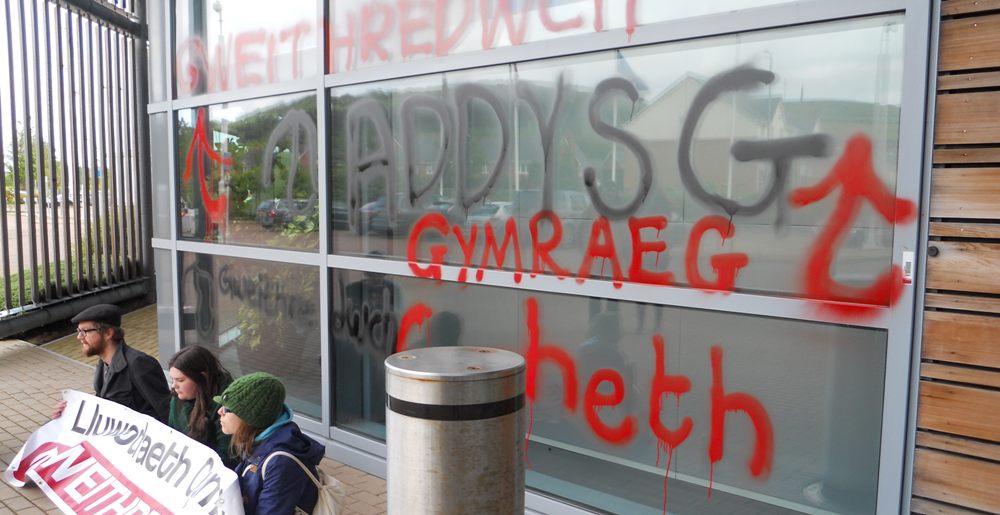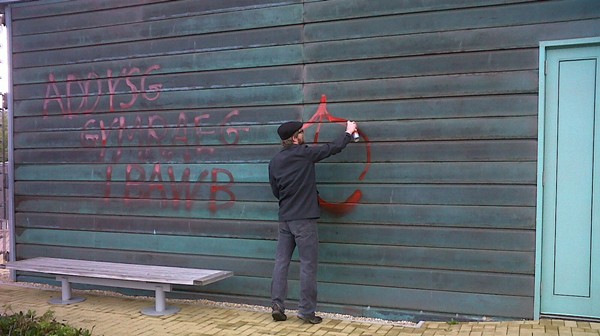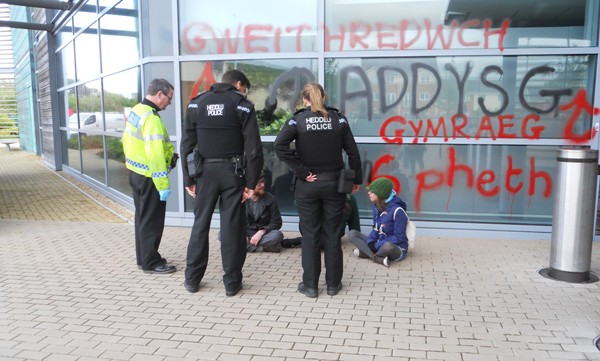

17.06.14
Yn gynnar ar fore dydd Llun, 12fed o Fai, cerddais i a dau aelod arall o Gymdeithas yr Iaith i swyddfeydd Llywodraeth Cymru yn Aberystwyth er mwyn paentio sloganau. O fewn chwarter awr, roedden ni wedi paentio ‘6pheth‘ ac ‘Addysg Gymraeg i Bawb - Gweithredwch’ mewn paent coch a du ar draws blaen yr adeliad - mae fideo o’r weithred yma. Ers mis Chwefror eleni, ymysg gweithredoedd eraill rydyn ni hefyd wedi cloi ein hunain i swyddfeydd y Llywodraeth yn Llandudno, Aberystwyth ac yng Nghaerdydd. Mae hyn oll yn rhan o ymgyrch yn galw ar Lywodraeth Cymru i fabwysiadu 6 pholisi ar frys er mwyn cryfhau sefyllfa’r iaith Gymraeg:
1. Addysg Gymraeg i Bawb
2. Tegwch Ariannol i'r Gymraeg
3. Gweinyddu'n fewnol yn Gymraeg
4. Safonau Iaith i Greu Hawliau Clir
5. Trefn Cynllunio er budd ein Cymunedau
6. Y Gymraeg yn greiddiol i Ddatblygu Cynaliadwy
Nid pawb sy’n cytuno gyda gweithredu yn y modd yma wrth gwrs. Mae rhai pobl yn anghytuno gydag unrhyw fath o weithredu tor-cyfraith di drais - ond yn wahanol i’r Torïaid, go brin y byddai darllenwyr Planet yn cwestiynu hawl ymgyrchwyr - o’r Suffragettes i’r fudiad wrth-apartheid i wrthwynebwyr ffracio - i ddefnyddio dulliau o’r fath. Efallai mai’r cwestiwn sylfaenol felly yw a yw sefyllfa’r Gymraeg yn gofyn am gweithredu o’r fath.
Dangosodd canlyniadau’r cyfrifad a gyhoeddwyd ar ddiwedd 2012 nid yn unig bod Cymru wedi colli 20,000 o siaradwyr Cymraeg rhwng 2001 a 2011, ond bod argyfwng yn bygwth seiliau cymunedol yr iaith, gyda llai na hanner poblogaeth siroedd Ceredigion a Chaerfyrddin yn ei siarad bellach. Mae ymchwil yn awgrymu’n gryf bod parhad cymunedau lle mae dros 70% yn medru’r iaith yn hanfodol i’w dyfodol fel iaith feunyddiol naturiol, felly mae’r cwymp yn y nifer o gymunedau o’r fath, o 92 yn 1991 i 39 yn 2011 yn dangos gwir argyfwng.
Dwi’n credu fod pobl Cymru eisiau gweld ein hiaith genedlaethol unigryw yn ffynnu ac eisiau byw yn Gymraeg - yn wir ‘dwi isio byw yn Gymraeg’ oedd neges y miloedd o bobl ddaeth i’n ralïau ymhob rhan o Gymru yn dilyn cyhoeddi canlyniadau’r cyfrifiad. Yn fwy cyffredinol, ystyrier y miloedd lawer o bobl sy’n ymdrechu’n wirfoddol dros yr iaith yn eu cymunedau, yn dysgu’r iaith fel oedolion, neu’n ceisio addysg Cymraeg i’w plant - yn wyneb cryn anhawster weithiau. Mae enghraifft y Fasgeg yn dangos bod deisyfiad pobl i weld eu hiaith yn byw yn gallu dwyn ffrwyth, ond mae rhywbeth ar goll yng Nghymru.

Ochr yn ochr â’r argyfwng demograffig, mae yna wactod arweiniad gwleidyddol. Mae record y Llywodraeth Lafur yng Nghaerdydd ar yr iaith yn waeth nag anobeithiol. Ymateb y Prif Weinidog Carwyn Jones i ganlyniadau’r cyfrifiad oedd cynnal ‘Cynhadledd Fawr’ - er mwyn sicrhau nad siop siarad oedd y Gynhadledd, gofynnon ni yn ddigon rhesymol iddo wneud 6 newid polisi yn y 6 mis yn dilyn y Gynhadledd. Wedi blwyddyn o dactegau oedi fyddai’n deilwng o Yes Minister, dyw Carwyn Jones heb gyhoeddi ei ymateb i argymhellion y Gynhadledd (nifer ohonynt yn cyd-fynd â’n galwadau ni, gyda llaw).
Mae Cymdeithas yr Iaith wedi bod yn weithgar wrth lobïo a datblygu’r math o bolisïau blaengar fyddai’n sicrhau dyfodol hyfyw i’r iaith - dyna sydd yn ein Maniffesto Byw. Rydym wedi mynd ati i lunio Bil Cynllunio amgen ein hunain fyddai’n sicrhau bod y drefn gynllunio yn gweithio er lles cymunedau cynaliadwy a’r Gymraeg, yn hytrach na datblygwyr mawr. Rydym wedi cyfarfod gydag aelodau Cynulliad o bob plaid, ac wedi cyfarfod gyda Carwyn Jones a’i swyddogion nifer o weithiau y llynedd.
Yn anffodus ni fu llythyru a chyfarfod yn ddigon i ddarbwyllo’r Llywodraeth o natur argyfyngus y sefyllfa - dim ond trwy weithredu ein hunain, a derbyn cyfrifoldeb, mae gwneud gwahaniaeth felly. Mae’r Gymdeithas yn fudiad ddi-drais - ac mae hynny’n golygu llawer mwy na pheidio anafu neb. Wrth weithredu, dydan ni ddim yn bwriadu cosbi’r Llywodraeth am eu methiant: yn hytrach, rydan ni am ddangos mor ddifrifol yw’r sefyllfa a mor bwysig ydyw eu bod yn llwyddo. Dwi’n credu roedd yr hyn wnes i yn iawn, yn wir yn wyneb diffyg ymateb y Llywodraeth i’r argyfwng sy’n wynebu’r Gymraeg, doedd dim dewis gen i ond gweithredu yn y modd yma a derbyn y canlyniadau. O ran canlyniadau paentio sloganau - roedd Bethan Williams a minnau o flaen Llys Ynadon Aberystwyth ddoe, ac rydym ar fechnïaeth tan yr achos llawn ddechrau mis Awst. Ond nid dyna fydd diwedd yr ymgyrch! Mae angen mwy o weithredu dros gymunedau cynaliadwy, dros ein hawliau, a thros y Gymraeg fel iaith i bawb yng Nghymru.
Bydd achos llawn Robin Farrar a Bethan Williams yn Llys Ynadon Aberystwyth am 10 yb ar ddydd Gwener, Awst 1af
Early on the morning of Monday 12th May I walked to the Welsh Government offices in Aberystwyth, along with two other members of Cymdeithas yr Iaith, with the intention of painting slogans. Within 15 minutes, we had painted ‘6pheth’ (‘6 things’) and ‘Addysg Gymraeg i Bawb - Gweithredwch’ (Welsh-medium Education for All - Take Action) in red and black paint on the front door of the building - there is a video of the protest here. Since February this year, among other actions we have also chained ourselves to Welsh Government offices in Llandudno, Aberystwyth and in Cardiff. All of this is part of our campaign calling for the Welsh Government urgently to adopt six policies in order to strengthen the Welsh language:
1. Addysg Gymraeg i Bawb / Welsh-medium Education for All
2. Tegwch Ariannol i'r Gymraeg / Fair Funding for Welsh
3. Gweinyddu'n fewnol yn Gymraeg / Make Welsh the language of work
4. Safonau Iaith i Greu Hawliau Clir / Clear Language Rights
5. Trefn Cynllunio er budd ein Cymunedau / Community-focused Planning System
6. Y Gymraeg yn greiddiol i Ddatblygu Cynaliadwy / Welsh central to Sustainable Development
Not everyone agrees with this form of protest action of course. Some would disagree with any kind of non-violent lawbreaking protest - but in contrast to the Tories, it's unlikely that Planet readers would question campaigners' rights to use these methods - from the Suffragettes to the anti-apartheid movement to opponents of fracking. Therefore, perhaps the key question is whether the situation of the Welsh language calls for such methods.
The census results published at the end of 2012 showed us that not only did Wales lose 20,000 Welsh speakers between 2001 and 2011, but that there is an emergency in the community base of the language, with less than half of the population in the counties of Ceredigion and Carmarthenshire now speaking it. Research suggests strongly that the continuation of communities where over 70% can speak the language is essential to its future as a natural daily language, therefore the drop in the number of such communities, from 92 in 1991 to 39 in 2011 clearly shows an emergency.
I believe that Wales' people want to see our unique national language thriving and want to live their lives in Welsh - indeed ‘dwi eisiau byw yn Gymraeg’ was the message of thousands of people who attended rallies in every part of Wales following the publication of the census results. More generally, consider the many thousands of people who make voluntary efforts for the language in their communities, who learn the language as adults or who seek out Welsh-medium education for their children - sometimes encountering significant hurdles. The example of the Basque language shows that a people’s aspiration to see their language thrive can bear fruit, but there is something missing in Wales.

Alongside the demographic emergency there is a lack of political leadership. The Labour Government's record in Cardiff on the language is worse than hopeless. The response of First Minister Carwyn Jones to the census results was to hold the ‘Cynhadledd Fawr / Big Conversation’. To ensure that this conference was not to become a mere talking shop, we requested that he make six policy changes in the six months following the conference. After a year of delaying tactics worthy of Yes Minister, Carwyn Jones has not published his response to the recommendations of the conference (a number of which correspond to calls from Cymdeithas, incidentally).
Cymdeithas yr Iaith has been actively lobbying and developing the kind of progressive policies which would ensure a viable future for the language - and it’s these which make up our Maniffesto Byw (Living Manifesto). We have developed our own alternative Planning Bill which would ensure that the planning system works for the benefit of sustainable communities and the Welsh language, rather than big developers. We have met Assembly Members of all parties and met Carwyn Jones and his officers several times last year.
Unfortunately letter-writing and meetings will not be enough to convince the Government of the urgent nature of the situation - only through acting ourselves, and accepting responsibility, will we change things. Cymdeithas is a non-violent movement - and that means much more than not injuring anybody. While taking action, we are not intending to punish the Government for their failure: rather, we wish to show the seriousness of the situation and how important it is that they succeed. I believe that what I did was right, certainly in respect of the Government's lack of response to the emergency facing the Welsh language. I had no choice but to take action using those means and accept the consequences. Speaking of the consequences of painting slogans, Bethan Williams and myself were before Aberystwyth Magistrates' Court yesterday, and we are on bail until the full trial at the beginning of August. Not that this will be the end of the campaign however! There is a need to take more actions for sustainable communities, for our rights, and for Welsh as a language for all in Wales.
The full case of Robin Farrar and Bethan Williams will be at Aberystwyth Magistrates' Court at 10AM on Friday 1 August.We feature further reviews and analysis in the magazine. See our contents pages in the archives section and you can buy issues here.